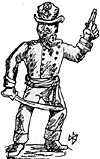 I was vacationing in South Carolina in April 2002 when I received a call from one of my four sons, David, a captain in the 101st Airborne Division (Air Assault). His brigade commander was taking forty officers to Washington for a week on official business but the trip would include tours of three Civil War battlefields: Manassas, Fredericksburg, and Chancellorsville. After I congratulated him on this fine opportunity to study his military heritage, he asked if I would be willing to lead a staff ride for the First Battle of Bull Run.
I was vacationing in South Carolina in April 2002 when I received a call from one of my four sons, David, a captain in the 101st Airborne Division (Air Assault). His brigade commander was taking forty officers to Washington for a week on official business but the trip would include tours of three Civil War battlefields: Manassas, Fredericksburg, and Chancellorsville. After I congratulated him on this fine opportunity to study his military heritage, he asked if I would be willing to lead a staff ride for the First Battle of Bull Run.
I was surprised and flattered as well. While my forte is the War of 1812, I have studied the American Civil War and had walked Bull Run many years earlier. I agreed only after careful consideration. I was at a particularly critical juncture with my job and I had other commitments during the time period. Well, I made adjustments to my schedule and began in earnest restudying Bull Run.
A staff ride is different than a battlefield tour. The students are expected to prepare themselves by learning the forces and commanders involved and to understand what happened on the ground. Thus, when the group actually walks the ground, they already know which units fought where and how the fight turned out. Several officers were assigned commanders to study and were tasked with briefing their commander to the rest of the group at an opportune time during the battlefield walk. This preparation allows the staff ride guide (me in this case) to focus not so much on what happened, but how and why it happened. Generally speaking, anecdotes from the battle are kept to a minimum except insofar as they establish a feel for what it was like for the soldiers and men. Also, the staff ride is concluded with an integration session in which the "staff riders" relate on what their discoveries mean for them personally. This attempt to derive "lessons learned" is often touted as the most valuable portion of the staff ride.
In May we conducted the staff ride. The day was beautiful. We walked from the Sudley Spring Ford to the Sudley Road. Then we walked the Matthews Hill fight and ended up crossing and recrossing Henry House Hill. The Park Service does a great job out there and the rangers were most helpful. The officers were very well prepared and their briefings on the various commanders were insightful. I enjoyed their questions and comments. Perhaps we had the most fun when I tasked them with the following question: "Suppose you were Beauregard and had to stitch together a defensive line on Henry House Hill. How_ would you do it?" These infantry officers jumped on that one and laid out fields of fire and artillery positions. It was great enjoyment for me to see some professionals at work.
Anyway, all this is by way of getting me ready to discuss some solo aspects of First Bull Run. In Part One I'll cover a brief description of the actual battle and then lay out some solo rules. In Part Two, I'll describe my results in re-fighting this battle as a solo player.
Going It Alone: The Solo Wargamers Corner First Bull Run
-
Introduction
The Preliminaries
Orders of Battle: USA and CSA
The Battle
Solo Rules
Cohesion, Command, and Control
Order of Battle
The Desperate Struggle
Back to Table of Contents -- Lone Warrior # 142
Back to Lone Warrior List of Issues
Back to MagWeb Magazine List
© Copyright 2003 by Solo Wargamers Association.
This article appears in MagWeb.com (Magazine Web) on the Internet World Wide Web.
Other military history articles and gaming articles are available at http://www.magweb.com
